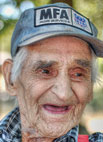
Natural treasures are abundant in the Ozarks. Some of its most fascinating treasures are the people. One of those delightful gems is 96-year-old Howard Raysho Hawkins. Known as “Raysho” to family and friends, he lives on a farm near Lebanon, Mo., in Laclede County.
With a cane in each hand, Raysho walked down a path to a hog wallow. As he walked, he called out with an indescribable sound that was all too familiar to his hogs. They came running.
An old truck was backed into the wallow and the rear tires were up on rocks (not blocks). Raysho climbed onto the bed of the truck, smacked his cane against the roof and threw out feed for his hogs. It is something he does daily.
Raysho grew up in a simpler time, but that doesn’t mean it was easy or the people less intelligent. He started raising hogs in 1927 and said, “I’ve had hogs ever since.”
His first hog was not bought at the sale barn or with money. Raysho explained, “An old man who lived up the road had a big spotted red sow. He wanted to quit because he was getting up in years. He asked me if I’d buy that sow.” Raysho bought his first hog with a load of cord wood.
At the time, he was cutting and splitting cord wood for the power house in Lebanon for $1.25 a cord. “Back then there wasn’t any chainsaws. You had to do it with a crosscut saw.”
Life began to change after Raysho met his wife, Laura Crawford. She lived in Oklahoma, but had relatives in Missouri.
He wanted to buy his wife-to-be a cook stove. Raysho said, “I sold the old big sow to the packing house. I bought her a new wood cook stove with what that old sow brought.” He picked the stove out of a catalog and they shipped it to him. “I think their name was Spiegel’s.”
Raysho had a one-seated buggy and an old gray mare. He said, “I sold my buggy and my old gray mare to buy a ticket to Oklahoma to marry my wife. I took an old passenger train, a steamer, down to Oklahoma.”
He was 23 and Laura was 22 when they married. “I stayed down there (Oklahoma) and started plowing for her dad in the fields. I was working for a while for him. Then he got a house fixed up there for me and Laura. When we got the house fixed up, we moved into it. Still, all my stuff was up here in Missouri,” he stated.
He made a trip to Missouri and took Laura’s stove, pots and pans, three sows, a cow and a heifer calf to Oklahoma. They lived there for over 10 years.
Raysho said, “Things got dull around there. The only money you could make was on hogs, cattle or cotton. I didn’t like to pick cotton so I came back here.” He moved his family and Laura’s cook stove to Missouri. He still has the remains of her stove.
It wasn’t long before he was back in the hog business. It is a business he has known since he was a boy living in Nebraska. His dad worked for a banker and they had “lots of hogs.” He said, “That’s when I got to shucking corn. I shucked 100 bushels a day.” Livestock has remained a part of Raysho’s life in Missouri. At one time he had “a bunch of goats to eat the brush down.” He also had 70 head of Polled Herefords and stated, “At one time I had around 200 head of brood sows.” He estimated he now has 50 or 60 hogs. He sells them to “anybody that’s got the money.”
He has sold as many as 200 and 300 head of hogs at a time and said, “They hauled them out in their big trailers.”
But times got rough for hog producers. Raysho said, “The hog business got so bad, people quit buying.”
Raysho Hawkins recalled the purchase of his first truck. It was a ’32 Model B Ford truck and he still has it, although it no longer runs. He said, “This fellow was selling Ford cars and trucks and Ford tractors and machinery. There was a truck sitting on his lot. One day I asked what he’d take for that old truck.” The man had bought it for his own use, but asked what Raysho would give for it.
“I said I’d give him 200 posts, $10 a hundred, for that old truck. He said, “You just made yourself a deal. You cut me 200 posts and it’s your truck.”
This farmer has seen a lot of changes over the years. While today’s kids have all the latest gadgets and technology, Raysho said he had something as a kid that most of today’s youngsters don’t. “A 410 double-barrel shotgun.”
It seemed fitting that Raysho threw the feed to his hogs by hand, because he has done a lot of manual labor in his lifetime. He recalled planting a corn field by hand and said, “You didn’t have corn planters. That was the way this country was raised; doing it by hand.”







